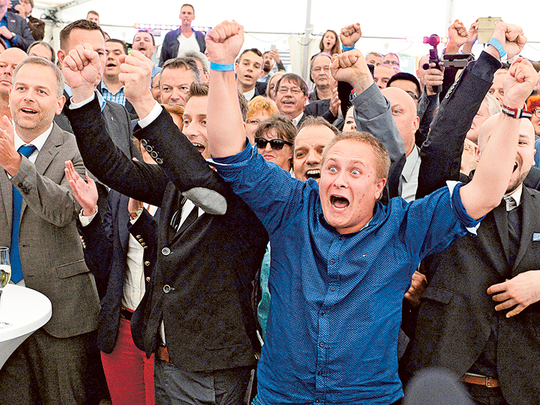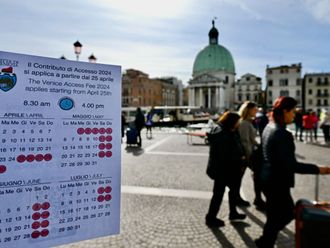
Berlin: German Chancellor Angela Merkel came under fresh fire over her open-door refugee policy on Monday after her party suffered a humiliating defeat against an upstart anti-migrant populist party in her home state.
The right-wing populist Alternative for Germany (AfD) party clinched almost 21 per cent in its first bid for seats in the regional parliament of Mecklenburg-Western Pomerania on Sunday.
With her eyes on national elections next year, AfD co-chief Beatrix von Storch hailed the shock outcome as “the beginning of the end of the Merkel era”, while Bild daily labelled the result another “slap across the face” for the chancellor.
The AfD’s rise mirrors success enjoyed by other anti-immigration parties across Europe, with France’s Front National (FN) riding high in the polls and a far-right populist eyeing the presidency in Austria in elections on October 2.
Merkel’s conservative Christian Democratic Union (CDU) won just 19 per cent in its worst ever score in the ex-communist northeastern state, while the Social Democrats maintained top place with over 30 per cent.
The state vote was held exactly one year after Merkel opened German borders to a mass influx of Syrian refugees and other migrants that would swell arrivals in Europe’s top economy to one million asylum seekers in 2015.
While her welcoming stance initially won much praise, the mood has since considerably darkened as popular worries have grown about how to integrate the newcomers.
The AfD has capitalised on such fears, especially since a spate of sexual assaults blamed on North African men on New Year’s Eve, and a series of bloody attacks this summer, some claimed by Daesh.
With its latest win, the Islamophobic AfD, founded just over three years ago, is now represented in nine out of Germany’s 16 regional parliaments, and hoping for more gains when the capital Berlin goes to the polls in two weeks.
The state election in the sprawling farming and coastal state is the latest to serve as a bellwether ahead of national elections in late 2017.
Merkel, in power for 11 years, has not yet said whether she will run for a fourth term but is widely expected to do so.
Although Sunday’s election was held in Germany’s poorest and least populous state, the outcome was significant in part because it is home to Merkel’s constituency, the port city of Stralsund.
“This was more than a small state election, it was a vote on Merkel,” said news site Spiegel Online, pointing at the “protest storm” in “Merkel’s living room”.
The AfD’s lead candidate in the state, Leif-Erik Holm, said “the icing on the cake is that we have left Merkel’s CDU behind us”.
Carsten Brzeski of ING-DiBa bank wrote that the outcome was “another shot across the bow for the national government and Chancellor Angela Merkel”.
“The refugee crisis is damaging Chancellor Merkel’s popularity, not only in the German population but also within the government coalition.”
Merkel’s conservative Bavarian allies the CSU renewed their demands for tougher policies on migrants.
The outcome was “a protest against the policies in Berlin”, said its secretary general Andreas Scheuer, renewing calls for an upper limit to the refugee intake.
The CDU’s general secretary Peter Tauber acknowledged that Sunday’s results were “bitter”, acknowledging that voters “wanted to send a signal of protest”.
Merkel, who was attending a G20 summit in the Chinese city of Hangzhou, was due to discuss the outcome with her party in a teleconference Monday.
The AfD was founded in 2013 as a Euro-sceptic party that advocated a return to the Deutschmark, but it has since shifted to become a mainly anti-immigration and Islamophobic party.
It has grown strongly even as its top members have sparked outrage with insulting remarks, including one disparaging star footballer Jerome Boateng, of mixed German and Ghanaian descent.
The right-wing populist party is the first to establish itself in the German political landscape since the Second World War, after decades in which no such party crossed the five per cent hurdle to enter national parliament.
At national level, it is now polling at 14 per cent according to a September survey, a gain of 10 points in the year since Merkel threw open German borders to a mass influx of asylum seekers.
French far-right leader Marine Le Pen wrote on Twitter: “What was impossible yesterday has become possible: the AfD patriots have swept away Merkel’s party!”
Conservative daily Die Welt commented: “Germany now has what has never existed since the end of the war: an extreme-right party.”












